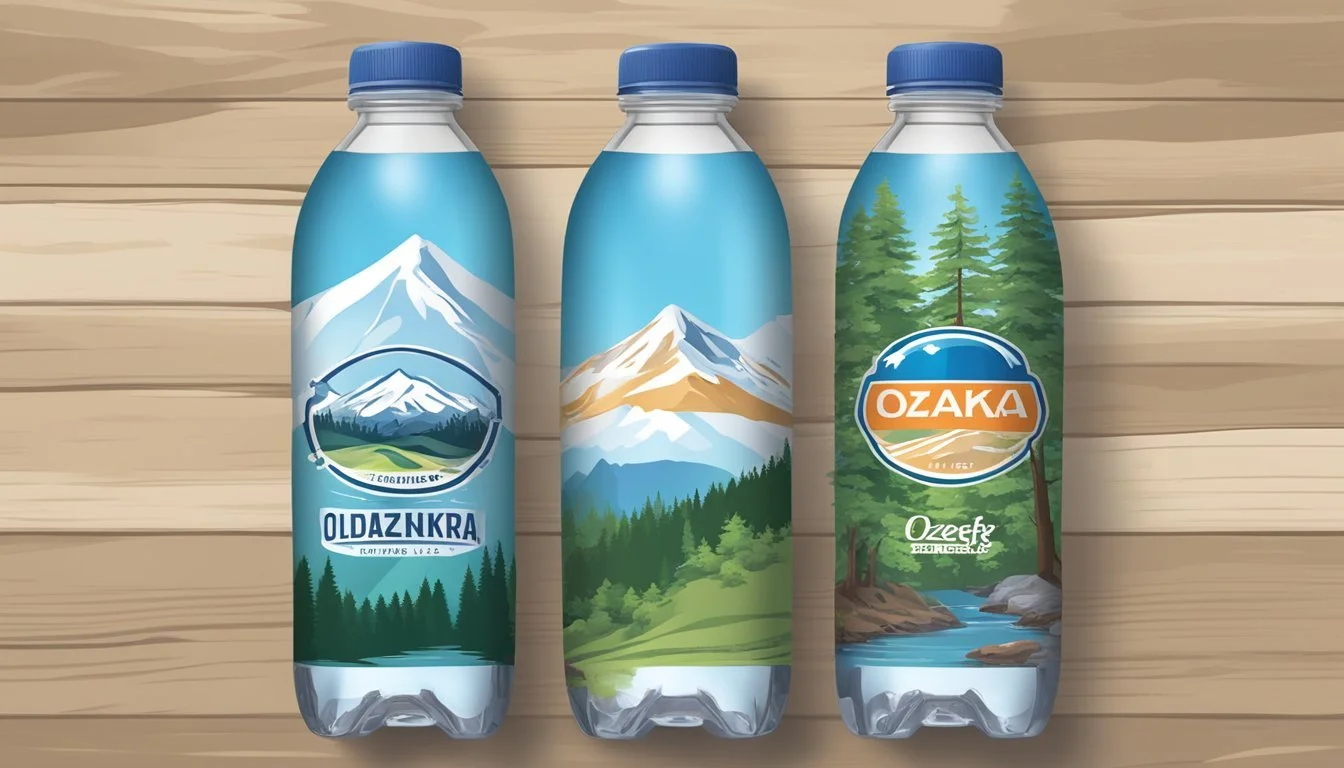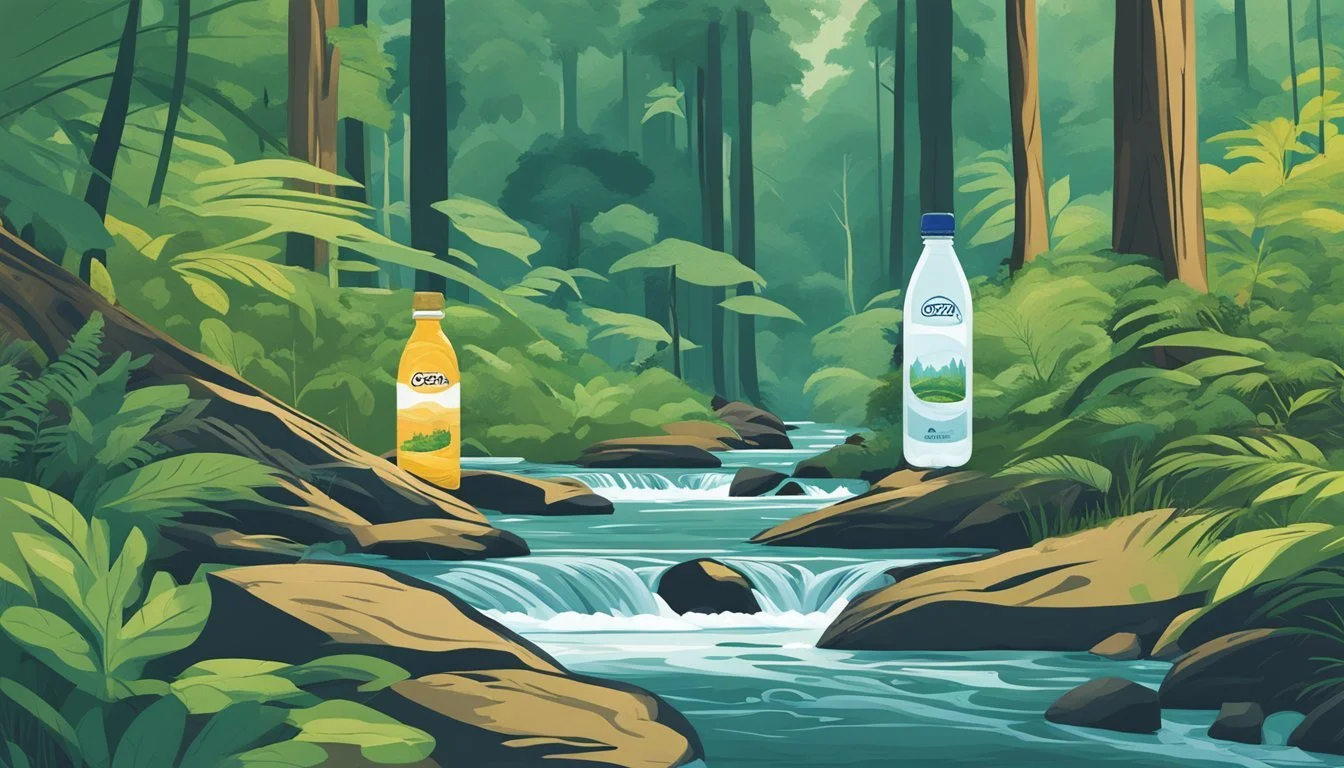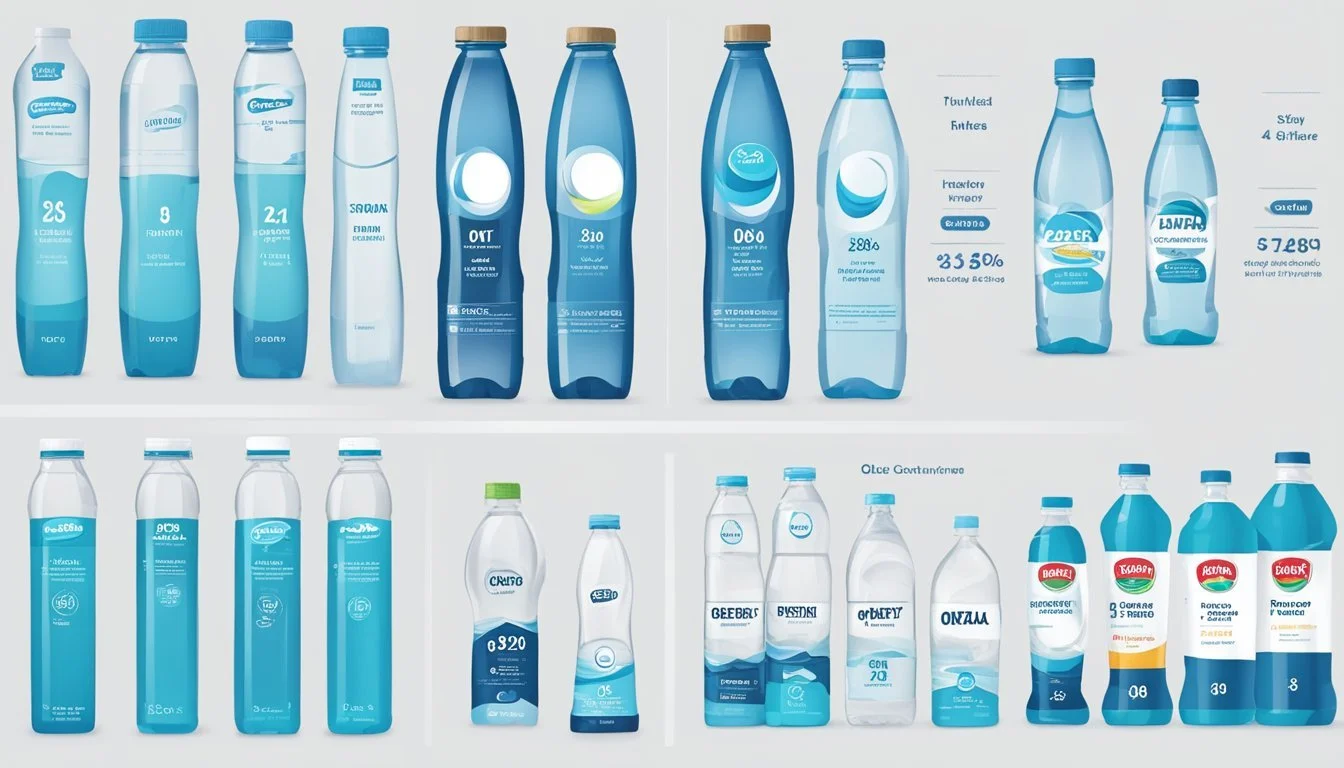Ozarka vs. Defy
A Comprehensive Bottled Water Comparison
For those seeking top-tier hydration, examining the attributes of Ozarka and Defy bottled waters proves essential. Ozarka, known for its natural spring water sourced from Texas, offers a refreshing and clean taste that aligns with its reputation. On the other hand, Defy stands out for its focus on enhancing hydration with added electrolytes and a pH-balanced formula.
When choosing between these two, it primarily depends on personal preference and desired benefits. Ozarka appeals to those who prioritize natural spring water's purity, whereas Defy is tailored for individuals seeking advanced hydration solutions with additional health benefits.
Both brands bring distinct qualities to the table, making the decision a matter of taste and lifestyle alignment. Readers will find comprehensive insights into each brand's benefits and potential drawbacks as they delve further into the article.
Understanding Bottled Water
Bottled water comes in various types, each with unique characteristics and regulations. Key considerations include the water source, treatment process, and adherence to safety standards.
History and Types of Bottled Water
Bottled water has a long history, dating back to the early 18th century when it was sold for supposed health benefits. Fast forward to today, it is a multibillion-dollar industry offering various types of water, such as spring water, mineral water, purified water, and sparkling water.
Spring water originates from underground sources and is collected at the spring or by tapping the source. Mineral water contains dissolved minerals and is bottled at the source with no additional minerals added. Purified water undergoes treatment processes like reverse osmosis to remove impurities, a method used by brands like Dasani and Aquafina. Sparkling water is carbonated, either naturally or by adding carbon dioxide, with brands like Perrier leading this category.
Bottled Water Market Overview
The bottled water market is diverse and competitive, with numerous brands catering to different tastes and preferences. Leading brands like Nestlé, Fiji, Voss, Evian, and Essentia emphasize their unique sources and purity levels.
Consumers prioritize different attributes, such as taste, mineral content, and environmental impact. For instance, Smartwater markets its vapor-distilled water, while Evian highlights its natural spring source from the French Alps. The International Bottled Water Association (IBWA) supports industry standards and consumer education.
In recent years, an increasing number of consumers have shown a preference for natural and minimally processed options, driving demand for 100% natural spring water and mineral water.
Regulations and Standards
Bottled water is regulated to ensure safety and quality. In the United States, the FDA oversees bottled water standards, while the EPA regulates tap water. Both entities ensure water quality through stringent regulations and regular quality reports.
Manufacturers must meet defined standards for contaminants, labeling, and processing. They often conduct their own quality tests to comply with these regulations. For instance, premium brands like Evian and Essentia publish detailed quality reports showcasing their commitment to purity.
The IBWA also provides additional industry guidelines to ensure best practices. Compliance with these standards helps maintain consumer trust and ensures that bottled water remains a safe alternative to tap water.
Ozarka and Defy: Brand Profiles
Understanding the distinct characteristics of Ozarka and Defy reveals key information about their water sourcing and brand positions, helping consumers make informed choices.
Ozarka: Texas's Spring Water
Ozarka sources its water from natural springs in Texas, providing consumers with 100% natural spring water. This local sourcing is a cornerstone of the brand's identity, emphasizing authenticity and a distinct regional character. Ozarka's water is known for its clean, refreshing taste with no added flavors or minerals.
Packaging often comes in various sizes, making it accessible for different consumer needs. Sustainability efforts include minimal plastic use, promoting eco-friendly practices. Ozarka consistently markets itself as a reliable, high-quality hydration option, ideal for those who prefer natural spring water from a trusted local source.
'Defy' Defined: Evaluating the Brand
Defy positions itself uniquely by enhancing its water with electrolytes, targeting active individuals seeking hydration benefits beyond just quenching thirst. This fortified water is designed to support athletic performance and recovery.
Sourced meticulously to ensure purity, Defy's marketing highlights its functional benefits, promoting the idea of optimal hydration for physical activities. The brand often focuses on advanced filtration processes to maintain high water quality. Packaging tends to be sleek and modern, appealing to a health-conscious demographic interested in performance and wellness.
By offering electrolyte-infused options, Defy differentiates itself from traditional spring water brands like Ozarka, carving a niche in the competitive bottled water market.
Health and Quality Analysis
Ozarka and Defy bottled water brands come with their own unique attributes concerning mineral content and safety. Understanding these factors can help determine the better choice for health-conscious consumers.
Mineral Content and Health Benefits
Ozarka is renowned for its natural spring water sourced from Texas. It includes naturally occurring minerals such as calcium, magnesium, and potassium, essential for maintaining good health. These minerals not only contribute to the water's taste but also offer health benefits like supporting bone health and muscle function.
Defy water, while marketing itself as a pH balanced alkaline water, also highlights the presence of naturally occurring electrolytes. This can be beneficial for maintaining hydration and electrolyte balance, which is crucial for those who engage in rigorous physical activities. Both brands emphasize the quality and purity of their water, ensuring that consumers get essential minerals without compromising on taste.
Safety and Contaminants Concerns
Safety is a key factor in choosing bottled water. Ozarka adheres to strict safety standards, regularly testing for contaminants like BPA, lead, and other heavy metals to ensure their water remains safe for consumption. Their commitment to providing pure, contaminant-free water makes it a reliable choice.
Defy also emphasizes safety by ensuring that their bottles are BPA-free and rigorously tested to avoid the presence of harmful chemicals like PFAS and arsenic. By focusing on stringent safety measures, Defy maintains a standard of quality that assures consumers of the water's purity.
In summary, both Ozarka and Defy take considerable steps to offer high-quality, safe drinking water with valuable health benefits, making them strong contenders in the bottled water market.
Taste and Purity Experience
Ozarka and Defy cater to consumers seeking distinctive taste profiles and high purity in bottled water. Differences in processing and sourcing profoundly shape their taste and quality.
The Influence of Source and Processing on Taste
The source of Ozarka water is natural springs located in Texas, which bring a distinct taste noted for its clean and refreshing qualities. The minimal processing required helps maintain its natural flavor.
Defy uses the Hydro-7 filtration process, which rigorously purifies the water. This method aims to remove impurities while imprinting a slightly enhanced mineral taste, delivering a crisp and smooth water experience.
Compared to Ozarka, Defy's more extensive processing results in a taste that some may find palatable and others possibly too refined. Both have distinct flavors influenced significantly by their respective sourcing and treatment methodologies.
Comparing the Purity of Ozarka and Defy
Purity is a major factor for both brands. Ozarka's spring water is known for its naturally occurring minerals, which contribute to its purity and taste. The bottling process ensures these minerals remain intact while avoiding added contaminants.
Defy's Hydro-7 process claims to achieve near-perfect purity by removing dissolved solids and impurities. It involves multiple stages of filtration and purification, ensuring high standards of water quality.
Both brands strive to offer a clean and pure drinking experience. While Ozarka leverages its natural origins for purity, Defy's technologically advanced filtration guarantees a different level of treated purity. Each method has its strengths, appealing to diverse consumer preferences.
Environmental and Sustainability Considerations
Both Ozarka and Defy bottled waters demonstrate varying degrees of environmental consciousness and sustainability efforts. Key factors include the types of packaging used and measures taken to mitigate plastic waste and environmental impact.
Assessing the Bottling Process
The bottling process significantly impacts environmental sustainability. Ozarka primarily uses PET bottles, which are lightweight and recyclable but contribute to plastic waste if not managed properly.
Defy, on the other hand, emphasizes the use of eco-friendly materials, incorporating recycled PET bottles and exploring alternatives such as boxed water. The focus on sustainability in the bottling process highlights the differences in their environmental approaches.
Sustainability Efforts by Ozarka and Defy
Ozarka has initiated several sustainability efforts. They promote recycling and have introduced bottles made with some percentage of recycled materials. Efforts to reduce the weight of their packaging also reflect their commitment to lessening their environmental footprint.
In contrast, Defy takes a more aggressive approach towards sustainability. They utilize a higher percentage of recycled materials in their packaging and are exploring glass bottles and boxed water options. Their initiatives often extend beyond bottling, aiming to minimize overall environmental impact.
Both brands acknowledge the importance of sustainability, yet their strategies and levels of commitment vary. Ozarka's efforts are noted, but Defy appears to be taking broader, more impactful steps towards environmental sustainability.
Consumer Insights and Preferences
Both Ozarka and Defy have carved out specific niches in the bottled water market, appealing to different aspects of consumer behavior and preferences.
Market Positioning and Customer Loyalty
Ozarka, drawing from springs in Texas, emphasizes local sourcing and natural spring water. This appeals to consumers who value regional authenticity and natural products. Defy, marketed as a premium performance water, targets fitness enthusiasts and those seeking enhanced hydration with added electrolytes.
Ozarka's regional branding fosters strong loyalty among consumers in the southern United States, who often view it as a staple tied to their local identity. Its reputation for consistency and natural taste reinforces this loyalty. In contrast, Defy's branding as a high-performance water attracts a dedicated following among athletes and fitness-minded individuals who prioritize enhanced hydration benefits over price.
Trends in Bottled Water Consumption
Consumer trends indicate a growing preference for healthier and more convenient hydration options. The rise in popularity of bottled water can be attributed to increasing health consciousness and a shift away from sugary drinks. Ozarka capitalizes on this trend by offering naturally sourced, additive-free water that appeals to purity-focused consumers.
Defy's focus on added electrolytes caters to another significant trend: the demand for functional beverages. Consumers are increasingly looking for bottled waters that offer more than just hydration. Defy's marketing strategy aligns perfectly with this trend, positioning it as a go-to option for post-workout recovery and daily fitness routines.
Both brands effectively tap into key consumer preferences, from Ozarka’s emphasis on natural spring water to Defy's enhancement for physical performance. These strategies reflect broader trends within the bottled water industry, catering to a diverse range of health-focused and convenience-seeking consumers.
Conclusion: Which Water Wins?
In comparing Ozarka and Defy, several factors play crucial roles in determining which bottled water stands out.
Taste
Consumers often place a high priority on taste. Ozarka, sourced from natural springs, brings a refreshing and clean flavor. Defy, known for its ultra-purified process and added electrolytes, often appeals to those preferring a crisp, enhanced taste.
Quality
Ozarka adheres to stringent quality standards with natural spring water that undergoes minimal processing. Defy employs a rigorous purification process, utilizing advanced filtration and the addition of electrolytes, aimed at delivering a high-quality, consistent product.
Health
For health-conscious consumers, mineral content in water can be vital. Ozarka retains natural minerals from its spring sources. Defy focuses on enhanced hydration through added electrolytes beneficial for active lifestyles. Both offer health benefits, with Defy slightly edging out in terms of added hydration benefits.
Environmental Impact
Sustainability and environmental impact are key. Ozarka sources water from natural springs, with a commitment to reducing its carbon footprint. Defy also places emphasis on sustainability, promoting recyclable packaging and aiming to reduce plastic use.
Consumer Preference
Ozarka is favored by those who prefer the natural taste of spring water. In contrast, Defy appeals to consumers looking for an enhanced, electrolyte-rich product. Defy's modern branding and focus on health benefits resonate well with a younger, active demographic.
Sustainability
Both brands emphasize sustainable practices. Ozarka focuses on responsible spring water sourcing and reducing environmental impact. Defy invests in recyclable and eco-friendly packaging solutions, enhancing their sustainability profile.
Verdict
Ozarka offers natural taste and minimal processing, while Defy provides a modern twist with added health benefits and high-quality purification. The best choice depends on individual preferences for taste, health, and environmental considerations.
More About Ozarka
Mountain Valley Spring Water vs Ozarka: Which Bottled Water is Better?
Ozarka vs Kirkland Signature: Which Bottled Water is Better?
Ozarka vs Richard's Rainwater: Which Bottled Water is Better?
Ozarka vs Whole Foods Italian Still Mineral water: Which Bottled Water is Better?




